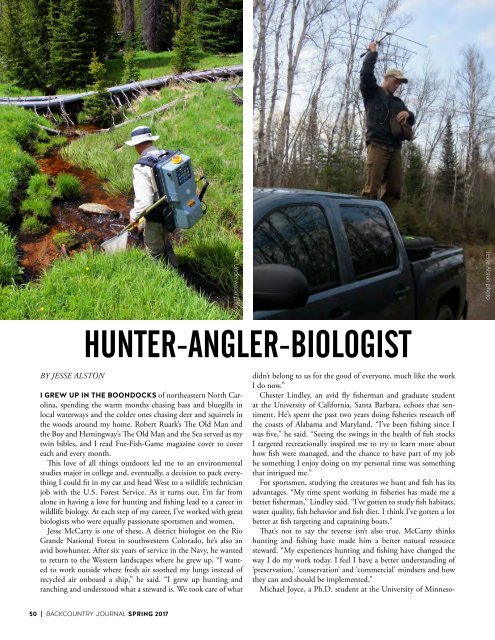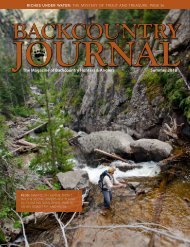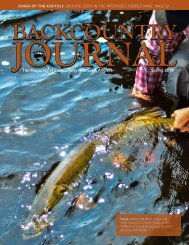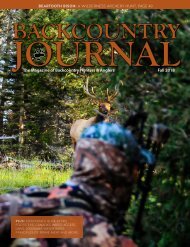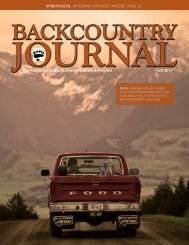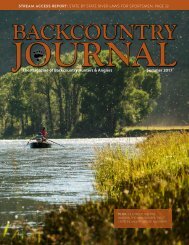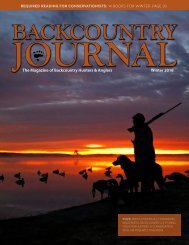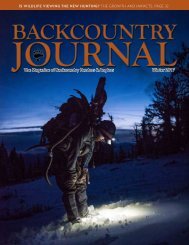BCJ_SPRING 17 Digital Edition
You also want an ePaper? Increase the reach of your titles
YUMPU automatically turns print PDFs into web optimized ePapers that Google loves.
Alec Underwood photo<br />
Jesse Alston photo<br />
ta-Duluth studying habitat use by martens and fishers (members<br />
of the weasel family), says hunting has helped him do better research<br />
as well. “The quiet solitude of a deer stand is often a good<br />
place for me to think deeply and critically about questions I’m<br />
grappling with in my research,” he said. I can’t say that I disagree.<br />
Hunting also helps with work in the field. “Hunting, in particular,<br />
has helped me learn about navigation, dealing with harsh<br />
weather and troubleshooting when something doesn’t go according<br />
to plan,” he said. “It has certainly provided ample opportunity<br />
for me to hone skills and to think about the factors that influence<br />
animal behavior.”<br />
Having hunters and anglers in game and fish agency positions<br />
benefits other sportsmen, too. As Lindley said, “I think it’s vital<br />
to have fishermen and hunters in wildlife management positions.<br />
People who have a vested interest in the health of fish and wildlife<br />
stocks are particularly well suited for positions of management.”<br />
This leads into perhaps the biggest issue facing hunters and anglers<br />
today: Conservation. Wildlife biologists rarely get to work<br />
with species that are doing well. Despite our best efforts, our careers<br />
are peppered with the death and destruction of the wildlife<br />
we love. This can lead to tension with other groups who love wildlife<br />
and think we could study and manage them better.<br />
Fellow sportsmen are one of those groups and can both exacerbate<br />
and alleviate this problem. “I know the sentiment among<br />
many fishermen is that regulations are overbearing,” Lindley said.<br />
“But I think the only reason stocks are starting to show an uptick<br />
in the last few years is because managers and fishermen alike are<br />
coming together to protect fish in new and inventive ways.”<br />
In managing the demands of the public, biologists also often<br />
face intense political pressure, from both above and below. As I’ve<br />
heard one biologist I know say, expecting biologists not to advocate<br />
for wildlife is like expecting dentists not to advocate for clean<br />
teeth. But agency biologists often can’t advocate their positions<br />
out of fear that the public might not agree.<br />
Despite these difficulties, I’m convinced there’s no better job.<br />
I’ve spent over half my workdays over the past few years in the<br />
great outdoors, becoming a better scientist and a better sportsman<br />
along the way. I’ve met a lot of great biologists and hope other<br />
sportsmen can do the same. It’s easy to grumble about regulations,<br />
but ultimately, no one has a greater stake in successful management<br />
than sportsmen-biologists, and no one takes more pride in<br />
a job well done.<br />
McCarty captures this idea perfectly: “Managing wildlife resources<br />
for the American people gives me a sense of pride and<br />
patriotism similar to my time in the service.”<br />
Among wildlife biologists, he’s far from alone. So next time<br />
you meet one of us, let us know what you’re seeing in the field.<br />
We’re glad to hear your stories, and we might have some for you<br />
as well.<br />
Jesse is a graduate student in the University of Wyoming’s zoology<br />
and physiology department and a proud BHA member. You can check<br />
out his research and field photography at jmalston.com or have a conversation<br />
on Twitter @integratecology.<br />
HUNTER-ANGLER-BIOLOGIST<br />
BY JESSE ALSTON<br />
I GREW UP IN THE BOONDOCKS of northeastern North Carolina,<br />
spending the warm months chasing bass and bluegills in<br />
local waterways and the colder ones chasing deer and squirrels in<br />
the woods around my home. Robert Ruark’s The Old Man and<br />
the Boy and Hemingway’s The Old Man and the Sea served as my<br />
twin bibles, and I read Fur-Fish-Game magazine cover to cover<br />
each and every month.<br />
This love of all things outdoors led me to an environmental<br />
studies major in college and, eventually, a decision to pack everything<br />
I could fit in my car and head West to a wildlife technician<br />
job with the U.S. Forest Service. As it turns out, I’m far from<br />
alone in having a love for hunting and fishing lead to a career in<br />
wildlife biology. At each step of my career, I’ve worked with great<br />
biologists who were equally passionate sportsmen and women.<br />
Jesse McCarty is one of these. A district biologist on the Rio<br />
Grande National Forest in southwestern Colorado, he’s also an<br />
avid bowhunter. After six years of service in the Navy, he wanted<br />
to return to the Western landscapes where he grew up. “I wanted<br />
to work outside where fresh air soothed my lungs instead of<br />
recycled air onboard a ship,” he said. “I grew up hunting and<br />
ranching and understood what a steward is. We took care of what<br />
didn’t belong to us for the good of everyone, much like the work<br />
I do now.”<br />
Chester Lindley, an avid fly fisherman and graduate student<br />
at the University of California, Santa Barbara, echoes that sentiment.<br />
He’s spent the past two years doing fisheries research off<br />
the coasts of Alabama and Maryland. “I’ve been fishing since I<br />
was five,” he said. “Seeing the swings in the health of fish stocks<br />
I targeted recreationally inspired me to try to learn more about<br />
how fish were managed, and the chance to have part of my job<br />
be something I enjoy doing on my personal time was something<br />
that intrigued me.”<br />
For sportsmen, studying the creatures we hunt and fish has its<br />
advantages. “My time spent working in fisheries has made me a<br />
better fisherman,” Lindley said. “I’ve gotten to study fish habitats,<br />
water quality, fish behavior and fish diet. I think I’ve gotten a lot<br />
better at fish targeting and captaining boats.”<br />
That’s not to say the reverse isn’t also true. McCarty thinks<br />
hunting and fishing have made him a better natural resource<br />
steward. “My experiences hunting and fishing have changed the<br />
way I do my work today. I feel I have a better understanding of<br />
‘preservation,’ ‘conservation’ and ‘commercial’ mindsets and how<br />
they can and should be implemented.”<br />
Michael Joyce, a Ph.D. student at the University of Minneso-<br />
50 | BACKCOUNTRY JOURNAL <strong>SPRING</strong> 20<strong>17</strong><br />
<strong>SPRING</strong> 20<strong>17</strong> BACKCOUNTRY JOURNAL | 51


